- Home
- Bill Bryson
The Life And Times Of The Thunderbolt Kid: A Memoir (v5.0) Page 4
The Life And Times Of The Thunderbolt Kid: A Memoir (v5.0) Read online
Page 4
The makers of sneakers also thoughtfully pocked the soles with numberless crevices, craters, chevrons, mazes, crop circles, and other rubbery hieroglyphs, so that when you stepped in a moist pile of dog shit, as you most assuredly did within three bounds of leaving the house, they provided additional absorbing hours of pastime while you cleaned them out with a stick, gagging quietly but oddly content.
Hours more of weekend time needed to be devoted to picking burrs off socks, taking corks out of bottle caps, peeling frozen wrappers off Popsicles, prising apart Oreo cookies without breaking either chocolate disk half or disturbing the integrity of the filling, and carefully picking labels off jars and bottles for absolutely no reason.
In such a world, injuries and other physical setbacks were actually welcomed. If you got a splinter you could pass an afternoon, and attract a small devoted audience, seeing how far you could insert a needle under your skin—how close you could get to actual surgery. If you got sunburned you looked forward to the moment when you could peel off a sheet of translucent epidermis that was essentially the size of your body. Scabs in Kid World were cultivated the way older people cultivate orchids. I had knee scabs that I kept for up to four years, that were an inch and three-quarters thick and into which you could press thumbtacks without rousing my attention. Nosebleeds were much admired, needless to say, and anyone with a nosebleed was treated like a celebrity for as long as it ran.
Because days were so long and so little occurred, you were prepared to invest long periods in just sitting and watching things on the off chance that something diverting might happen. For years, whenever my father announced that he was off to the lumberyard I dropped everything to accompany him in order to sit quietly on a stool in the wood-cutting room in the hope that Moe, the man who trimmed wood to order on a big buzz saw, would send one of his few remaining digits flying. He had already lost most of six or seven fingers, so the chances of a lively accident always seemed good.
Buses in Des Moines in those days were electrically powered, and drew their energy from a complicated cat’s cradle of overhead wires, to which each was attached by means of a metal arm. Especially in damp weather, the wires would spark like fireworks at a Mexican fiesta as the arm rubbed along them, vividly underscoring the murderous potency of electricity. From time to time, the bus-arm would come free of the wires and the driver would have to get out with a long pole and push it back into place—an event that I always watched with the keenest interest because my sister assured me that there was every chance he would be electrocuted.
Other long periods of the day were devoted to just seeing what would happen—what would happen if you pinched a match head while it was still hot or made a vile drink and took a sip of it or focused a white-hot beam of sunlight with a magnifying glass on your Uncle Dick’s bald spot while he was napping. (What happened was that you burned an amazingly swift, deep hole that would leave Dick and a team of specialists at Iowa Lutheran Hospital puzzled for weeks.)
Thanks to such investigations and the abundance of time that made them possible, I knew more things in the first ten years of my life than I believe I have known at any time since. I knew everything there was to know about our house for a start. I knew what was written on the undersides of tables and what the view was like from the tops of bookcases and wardrobes. I knew what was to be found at the back of every closet, which beds had the most dust balls beneath them, which ceilings the most interesting stains, where exactly the patterns in wallpaper repeated. I knew how to cross every room in the house without touching the floor, where my father kept his spare change and how much you could safely take without his noticing (one-seventh of the quarters, one-fifth of the nickels and dimes, as many of the pennies as you could carry). I knew how to relax in an armchair in more than one hundred positions and on the floor in approximately seventy-five more. I knew what the world looked like when viewed through a Jell-O lens. I knew how things tasted—damp washcloths, pencil ferrules, coins and buttons, almost anything made of plastic that was smaller than, say, a clock radio, mucus of every variety of course—in a way that I have more or less forgotten now. I knew and could take you at once to any illustration of naked women anywhere in our house, from a Rubens painting of fleshy chubbos in Masterpieces of World Painting to a cartoon by Peter Arno in the latest issue of The New Yorker to my father’s small private library of girlie magazines in a secret place known only to him, me, and 111 of my closest friends in his bedroom.
I knew how to get between any two properties in the neighborhood, however tall the fence or impenetrable the hedge that separated them. I knew the cool feel of linoleum on bare skin and what everything smelled like at floor level. I knew pain the way you know it when it is fresh and interesting—the pain, for example, of a toasted marshmallow in your mouth when its interior is roughly the temperature and consistency of magma. I knew exactly how clouds drifted on a July afternoon, what rain tasted like, how ladybugs preened and caterpillars rippled, what it felt like to sit inside a bush. I knew how to appreciate a really good fart, whether mine or someone else’s.
The someone else was nearly always Buddy Doberman, who lived across the alley, a secretive lane that ran in a neighborly fashion behind our houses. Buddy was my best friend for the first portion of my life. We were extremely close. He was the only human being whose anus I have ever looked at closely, or indeed at all, just to see what one looks like (reddish, tight, and very slightly puckered, as I recall with a rather worrying clarity), and he was good-tempered and had wonderful toys to play with, as his parents were both generous and well-to-do.
He was sweetly stupid, too, which was a bonus. When he and I were four his grandfather gave us a pair of wooden pirate swords that he had made in his workshop and we went with them more or less straight to Mrs. Van Pelt’s prized flower border, which ran for about thirty yards along the alley. In a whirl of frenzied motion that anticipated by several years the lively destructive actions of a Weedwhacker, we decapitated and eviscerated every one of her beloved zinnias in a matter of seconds. Then, realizing the enormity of what we had just done—Mrs. Van Pelt showed these flowers at the state fair; she talked to them; they were her children—I told Buddy that this was not a good time for me to be in trouble on account of my father had a fatal disease that no one knew about, so would he mind taking all the blame? And he did. So while he was sent to his room at three o’clock in the afternoon and spent the rest of the day as a weepy face at a high window, I was on our back porch with my feet up on the rail, gorging on fresh watermelon and listening to selected cool disks on my sister’s portable phonograph. From this I learned an important lesson: lying is always an option worth trying. I spent the next six years blaming Buddy for everything bad that happened in my life. I believe he eventually even took the rap for burning the hole in my Uncle Dick’s head even though he had never met my Uncle Dick.
THEN, AS NOW, Des Moines was a safe, wholesome city. The streets were long, straight, leafy, and clean and had solid middle-American names: Woodland, University, Pleasant, Grand. (There was a local joke, much retold, about a woman who was goosed on Grand and thought it was Pleasant.) It was a nice city—a comfortable city. Most businesses were close to the road and generally had lawns out front instead of parking lots. Public buildings—post offices, schools, hospitals—were always stately and imposing. Gas stations often looked like little cottages. Diners (or roadhouses) brought to mind the type of cabins you might find on a fishing trip. Nothing was designed to be particularly helpful or beneficial to cars. It was a greener, quieter, less intrusive world.
Grand Avenue was the main artery through the city, linking downtown, where everyone worked and did all serious shopping, with the residential areas beyond. The best houses in the city lay to the south of Grand on the west side of town, in a hilly, gorgeously wooded district that ran down to Waterworks Park and the Raccoon River. You could walk for hours along the wandering roads in there and never see anything but perfect lawns, old trees, freshly wa
shed cars, and lovely, happy homes. It was miles and miles of the American dream. This was my district. It was known as South of Grand.
The most striking difference between then and now was how many kids there were then. America had thirty-two million children aged twelve or under in the mid-1950s, and four million new babies were plopping onto the changing mats every year. So there were kids everywhere, all the time, in densities now unimaginable, but especially whenever anything interesting or unusual happened. Early every summer, at the start of the mosquito season, a city employee in an open jeep would come to the neighborhood and drive madly all over the place—across lawns, through woods, bumping along culverts, jouncing into and out of vacant lots—with a fogging machine that pumped out dense, colorful clouds of insecticide through which at least eleven thousand children scampered joyously for most of the day. It was awful stuff—it tasted foul, it made your lungs chalky, it left you with a powdery saffron pallor that no amount of scrubbing could eradicate. For years afterward whenever I coughed into a white handkerchief I brought up a little ring of colored powder.
But nobody ever thought to stop us or suggest that it was perhaps unwise to be scampering through choking clouds of insecticide. Possibly it was thought that a generous dusting of DDT would do us good. It was that kind of age. Or maybe we were just considered expendable because there were so many of us.*2
The other difference from those days was that kids were always outdoors—I knew kids who were pushed out the door at eight in the morning and not allowed back in until five unless they were on fire or actively bleeding—and they were always looking for something to do. If you stood on any corner with a bike—any corner anywhere—more than a hundred children, many of whom you had never seen before, would appear and ask you where you were going.
“Might go down to the Trestle,” you would say thoughtfully. The Trestle was a railway bridge over the Raccoon River from which you could jump in for a swim if you didn’t mind paddling around among dead fish, old tires, oil drums, algal slime, heavy metal effluents, and uncategorized goo. It was one of ten recognized landmarks in our district. The others were the Woods, the Park, the Little League Park (or “the Ballpark”), the Pond, the River, the Railroad Tracks (usually just “the Tracks”), the Vacant Lot, Greenwood (our school), and the New House. The New House was any house under construction and so changed regularly.
“Can we come?” they’d say.
“Yeah, all right,” you would answer if they were your size or “If you think you can keep up” if they were smaller. And when you got to the Trestle or the Vacant Lot or the Pond there would already be six hundred kids there. There were always six hundred kids everywhere except where two or more neighborhoods met—at the Park, for instance—where the numbers would grow into the thousands. I once took part in an ice hockey game at the lagoon in Greenwood Park that involved four thousand kids, all slashing away violently with sticks, and went on for at least three-quarters of an hour before anyone realized that we didn’t have a puck.
Life in Kid World, wherever you went, was unsupervised, unregulated, and robustly—at times insanely—physical, and yet it was a remarkably peaceable place. Kids’ fights never went too far, which is extraordinary when you consider how ill-controlled children’s tempers are. Once when I was about six, I saw a kid throw a rock at another kid, from quite a distance, and it bounced off the target’s head (quite beautifully I have to say) and made him bleed. This was talked about for years. People in the next county knew about it. The kid who did it was sent for about ten thousand hours of therapy.
We didn’t otherwise engage in violence, other than accidentally, though we did sometimes (actually quite routinely) give a boy named Milton Milton knuckle rubs for having such a stupid name and also for spending his life pretending to be motorized. I never knew whether he was supposed to be a train or a robot or what, but he always moved his arms like pistons when he walked and made puffing noises, and so naturally we gave him knuckle rubs. We had to. He was born to be rubbed.
WITH RESPECT TO ACCIDENTAL BLOODSHED, it is my modest boast that I became the neighborhood’s most memorable contributor one tranquil September afternoon in my tenth year while playing football in Leo Collingwood’s backyard. As always, the game involved about a hundred and fifty kids, so normally when you were tackled you fell into a soft, marshmallowy mass of bodies. If you were really lucky you landed on Mary O’Leary and got to rest on her for a moment while waiting for the others to get off. She smelled of vanilla—vanilla and fresh grass—and was soft and clean and painfully pretty. It was a lovely moment. But on this occasion I fell outside the pack and hit my head on a stone retaining wall. I remember feeling a sharp pain at the top of my head toward the back.
When I stood up, I saw that everyone was staring at me with a single rapt expression and inclined to give me some space. Lonny Brankovich looked over and instantly melted in a faint. In a candid tone his brother said: “You’re gonna die.” Naturally I couldn’t see what absorbed them, but I gather from later descriptions that it looked as if I had a lawn sprinkler plugged into the top of my head, spraying blood in all directions in a rather festive manner. I reached up and found a mass of wetness. To the touch, it felt more like the kind of outflow you get when a truck crashes into a fire hydrant or oil is struck in Oklahoma. This felt like a job for Red Adair.
“I think I’d better go get this seen to,” I said soberly, and with a fifty-foot stride left the yard. I bounded home in three steps and stepped into the kitchen, fountaining lavishly, where I found my father standing by the window with a cup of coffee dreamily admiring Mrs. Bukowski, the young housewife from next door. Mrs. Bukowski had the first bikini in Iowa and wore it while hanging out her wash.
My father looked at my spouting head, allowed himself a moment’s mindless adjustment, then leaped instantly and adroitly into panic and disorder, moving in as many as six directions at once, and calling in a strained voice to my mother to come at once and bring lots and lots of towels—“old ones!”—because Billy was bleeding to death in the kitchen.
Everything after that went by in a blur. I remember being seated with my head pressed to the kitchen table by my father as he endeavored to stanch the flow of blood and at the same time get through on the phone to Dr. Alzheimer, the family physician, for guidance. Meanwhile, my mother, ever imperturbable, searched methodically for old rags and pieces of cloth that could be safely sacrificed (or were red already) and dealt with the parade of children who were turning up at the back door with bone chips and bits of gray tissue that they had carefully lifted from the rock and thought might be part of my brain.
I couldn’t see much, of course, with my head pressed to the table, but I did catch reflected glimpses in the toaster and my father seemed to be into my cranial cavity up to his elbows. At the same time he was speaking to Dr. Alzheimer in words that failed to soothe. “Jesus Christ, Doc,” he was saying. “You wouldn’t believe the amount of blood. We’re swimming in it.”
On the other end I could hear Dr. Alzheimer’s dementedly laid-back voice. “Well, I could come over, I suppose,” he was saying. “It’s just that I’m watching an awfully good golf tournament. Ben Hogan is having a most marvelous round. Isn’t it wonderful to see him doing well at his time of life? Now then, have you managed to stop the bleeding?”
“Well, I’m sure trying.”
“Good, good. That’s excellent—that’s excellent. Because he’s probably lost quite a lot of blood already. Tell me, is the little fellow still breathing?”
“I think so,” my father replied.
I nodded helpfully.
“Yes, he’s still breathing, Doc.”
“That’s good, that’s very good. Okay, I tell you what. Give him two aspirin and nudge him once in a while to make sure he doesn’t pass out—on no account let him lose consciousness, do you hear, because you might lose the poor little fellow—and I’ll be over after the tournament. Oh, look at that—he’s gone straight off the green int
o the rough.” There was the sound of Dr. Alzheimer’s phone settling back into the cradle and the buzz of disconnection.
Happily, I didn’t die and four hours later was to be found sitting up in bed, head extravagantly turbaned, well rested after a nap that came during one of those passing three-hour moments when my parents forgot to check on my wakefulness, eating tubs of chocolate ice cream, and regally receiving visitors from the neighborhood, giving particular priority to those who came bearing gifts. Dr. Alzheimer arrived later than promised, smelling lightly of bourbon. He spent most of the visit sitting on the edge of my bed and asking me if I was old enough to remember Bobby Jones. He never did look at my head. Dr. Alzheimer’s fees, I believe, were very reasonable, too.
APART FROM MEDICAL PRACTITIONERS, Iowa offered little in the way of natural dangers, though one year when I was about six we had an infestation of a type of giant insect called cicada killers. Cicada killers are not to be confused with cicadas, which are themselves horrible things—like small flying cigars, but with staring red eyes and grotesque pincers, if I recall correctly. Well, cicada killers were much worse. They only emerged from the ground every seventeen years, so nobody, even adults, knew much about them. There was endless debate over whether the “killer” in “cicada killer” signified that they were killers of cicadas or that they were cicadas that killed. The consensus pointed to the latter.

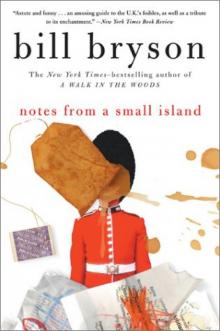 Notes from a Small Island
Notes from a Small Island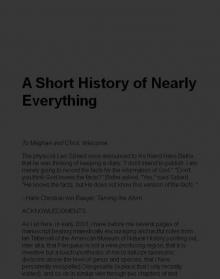 A Short History of Nearly Everything
A Short History of Nearly Everything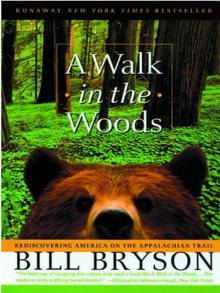 A Walk in the Woods
A Walk in the Woods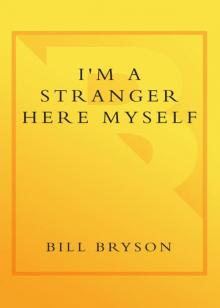 I'm a Stranger Here Myself
I'm a Stranger Here Myself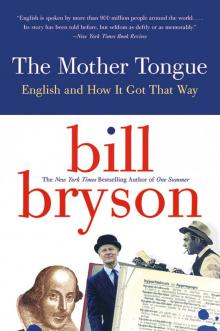 The Mother Tongue
The Mother Tongue Shakespeare
Shakespeare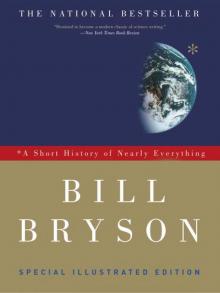 A Short History of Nearly Everything: Special Illustrated Edition
A Short History of Nearly Everything: Special Illustrated Edition The Best American Travel Writing 2016
The Best American Travel Writing 2016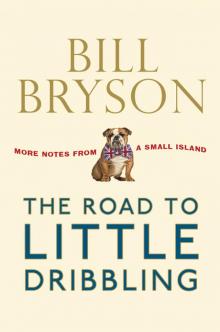 The Road to Little Dribbling
The Road to Little Dribbling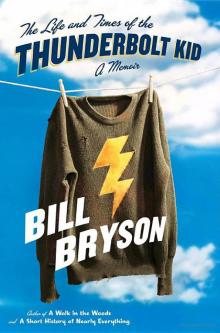 The Life And Times Of The Thunderbolt Kid: A Memoir (v5.0)
The Life And Times Of The Thunderbolt Kid: A Memoir (v5.0)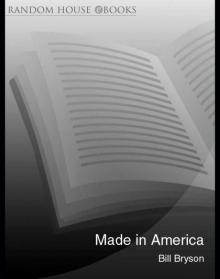 Made In America
Made In America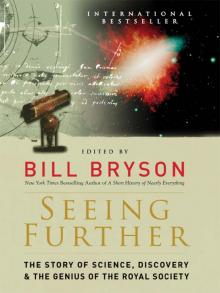 Seeing Further
Seeing Further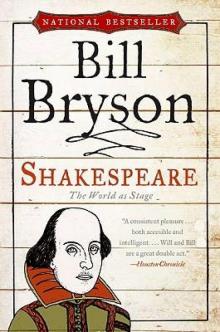 Shakespeare: The World as Stage
Shakespeare: The World as Stage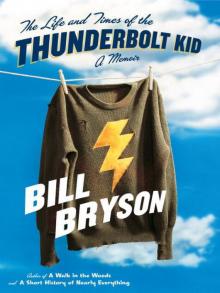 The Life and Times of the Thunderbolt Kid
The Life and Times of the Thunderbolt Kid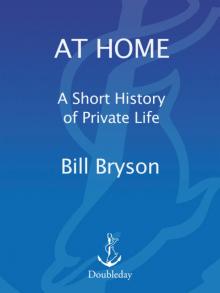 At Home
At Home Bryson's Dictionary For Writers And Editors (v5.0)
Bryson's Dictionary For Writers And Editors (v5.0) Neither Here Nor There
Neither Here Nor There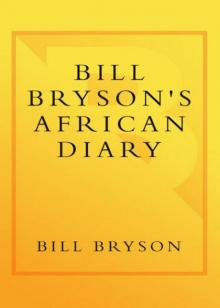 Bill Bryson's African Diary
Bill Bryson's African Diary